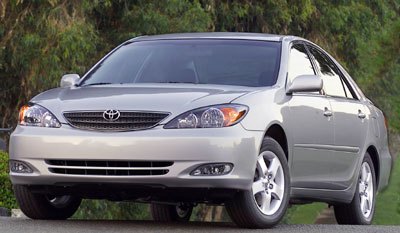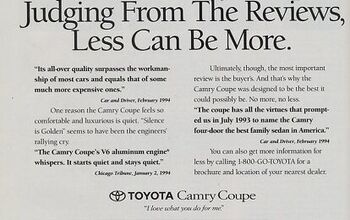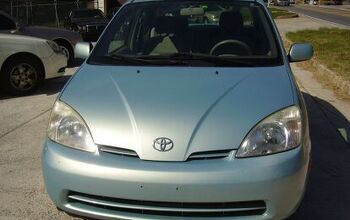Sell, Lease, Rent or Keep: 2003 Toyota Camry LE
Certain cars make you feel better after you have driven them. A late-90’s Jaguar XJ8 swathed in Connolly Leather. A late model Mercedes S-Class that’s running properly. And of course a Lexus LS430 which has been known to put some drivers in a near euthanasia state. Then of course there’s the classic American Buick of the 21st Century… the Toyota Camry.
I feel better every time I drive this car. Sure the dashboard is made by Rubbermaid and the interior door panels feel like they belong in an older Kia. But the car ‘works’. I drive it down the street and it’s cloud city USA! The road and the drive become an afterthought as a 2/10’s driving style becomes the de facto standard for the driver/zombie. Anyone can drive this car and for many, it IS their last car. This one was owned by two Grandmas. So should I sell it?
It has 112k on the 4-cylinder and everything needed to be done on it has been taken care of. Sale price? $6500. Possibly settle for six. I have already used it as a long-term rental and the last time out it netted $2000 for about 8000 miles of driving. A lot of H1-B’s absolutely adore a cloud riding car that can gobble up the miles with outstanding reliability and excellent fuel economy. Is the Camry a living legend or a myth when it comes to these things? It doesn’t matter. Reputation always sells. I now offer it as a long-term rental to those who are fiscally conservative and responsible.
But then again… should I? As time goes on I’m realizing that an older Camry and Corolla may be cheaper to own than our two current Honda hybrids. The Civic Hybrid was only saved by the fact that the nearby junkyard didn’t even list the four-figured part I needed. I recently got it for $100. The Insight recently ate it’s CVT. I had to buy a totalled $1800 Insight just for the Honda reman tranny inside of it. That one has only 17k and I should be able to make my money back on all the parts that came with it (most especially the IMA battery). But how many bullets do I need to dodge here? With a lightly driven Camry, you have a known economic proposition.
Speaking of that, if you finance this vehicle you are likely looking at a $10k net return over a 3 year period. $1000 to $1500 down. $60 a week for 36 months. In the world of sub-prime financing Toyota’s and Honda’s command very stiff price premiums. The one I just mentioned wouldn’t even be a stiff one. I know several captive dealerships (those that tote their own note) that would likely put payments in the 14k range.
So should I rent the Camry to an industrious and under-paid visitor from Pakistan or India? Finance it to a status conscious American? Or sell it to another member of the senior citizen brigade? There are no right answers… except one.
More by Steven Lang
Latest Car Reviews
Read moreLatest Product Reviews
Read moreRecent Comments
- Tane94 Awaiting the EV3 unveil this month. Kia continues to lead, though I will miss the Soul
- Jeanbaptiste I know this will never be seen, but the real answer is NO Government mandated tech. The reason why is that when the government mandates something, we miss out on signals that the free market will give to weather or not people actually want this or that this tech would actually help. It's like mandating AM radio for cars when people could just buy a $10 am radio if they really like am so much.
- 28-Cars-Later $12K? I needed a good laugh.
- EBFlex Wait...the feds are claiming that inflation was not FJBs fault 6 months prior to an election where he is massively losing in the polls in every single category?Eyebrow raised.
- MaintenanceCosts Most of the article after the blockquote is Posky laboring mightily to somehow blame this clearly anticompetitive and oligopolistic conduct on the big bad government.I look forward to some of the usual commenters explaining to us that, actually, the oil industry is a cuddly teddy bear and the real villain is people trying to sell us cars that don't use oil.

































Comments
Join the conversation
Ive been driving one of these for 7 years now with 140K. Only one minor a/c repair other than normal maintenance. It is boring as hell but also quiet and comfortable. I was told by a mechanic the timing belt is a chain and doesnt have to be replaced. Keep it.
Sell it and buy something that won't put you to sleep with its soporific driving experience. And something that won't accelerate on its own.